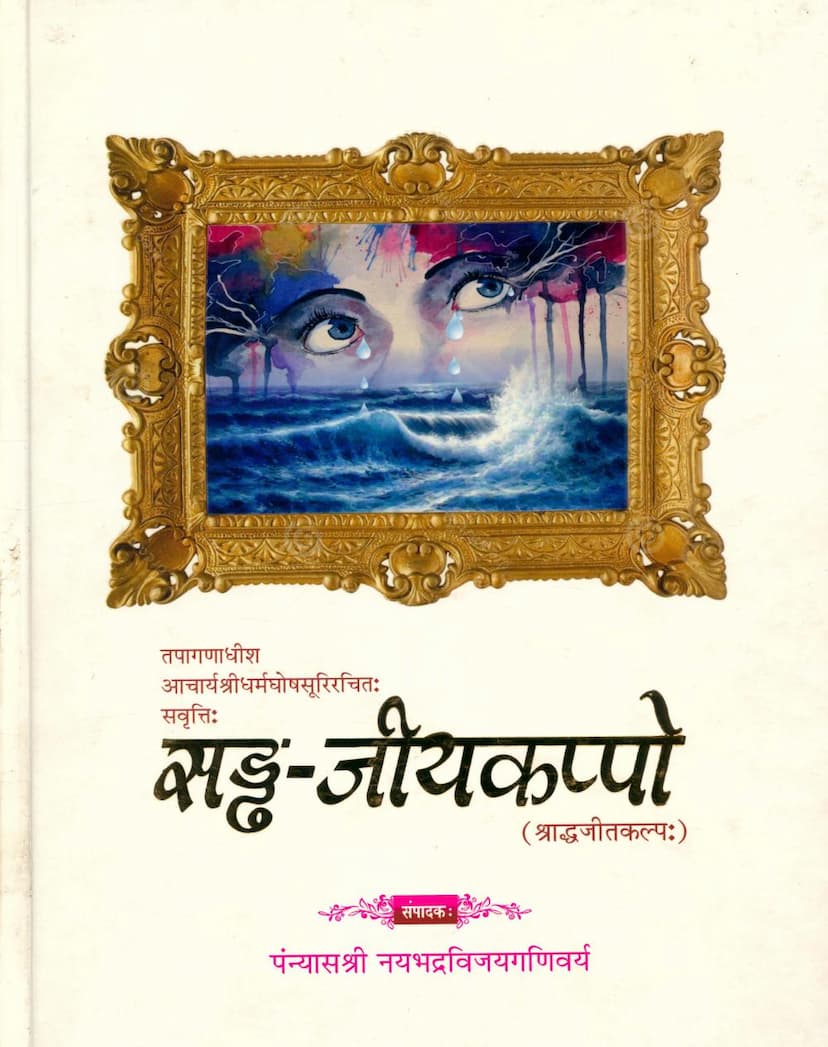Saddha Jiyakappo
Added to library: September 2, 2025

Summary
This document is the "Shraddhajita Kalpa" (Saddhajiyakappo), a Jain text authored by Acharya Shri Dharmaghosha Suri, with commentary (vritti) by Naybhadra Vijay Gani. The catalog link points to a scanned version of this text from the Jain Library.
Here's a comprehensive summary in English, based on the provided pages:
Overall Purpose and Significance:
The "Shraddhajita Kalpa" is a foundational Jain text that primarily deals with penance (prayaschitta) and purification rituals for lay followers (shravakas). Unlike many other Cheda Sutras which focus on the conduct and penance of monks, this text's uniqueness lies in its specific guidance for the laity who have committed transgressions in their spiritual practice. It outlines the atonements and procedures required to rectify these lapses and maintain spiritual purity.
Key Themes and Content:
-
Importance of Penance: The text strongly emphasizes that penance is essential for purifying one's character and rectifying faults that may occur in religious observance. It highlights that true happiness and liberation (moksha) are achieved through the purification of conduct (charitra).
-
Guidance for Lay Followers: The core of the text is dedicated to specifying the penances for various misdeeds or lapses committed by lay followers. This includes a wide range of actions that are considered infractions of their vows and duties.
-
Specific Transgressions and Their Penances: The text meticulously details numerous scenarios, categorized by the type of transgression and the associated penance. These include:
- Violations related to the First Vow (Ahimsa/Non-violence): This covers transgressions involving accidental or intentional harm to living beings (from one-sensed to five-sensed), including specific instructions related to the movement and usage of objects that might harbor life (like water, earth, fire, wind, and vegetation).
- Violations related to the Second Vow (Truthfulness/Satya): This would encompass lying, false accusations, slander, and other forms of misrepresentation.
- Violations related to the Third Vow (Non-stealing/Asteya): This covers theft, taking what is not given, and cheating.
- Violations related to the Fourth Vow (Celibacy/Brahmacharya): This addresses transgressions concerning sexual conduct, including improper thoughts, actions, and relationships.
- Violations related to the Fifth Vow (Non-possession/Aparigraha): This pertains to excessive attachment to possessions and the breaking of rules related to their usage and accumulation.
- Lapses in Other Observances: The text also details penances for violations related to:
- Dietary Rules: Consumption of forbidden foods, improper preparation of food, or eating at improper times.
- Ritualistic Purity: Improper conduct during religious ceremonies, touching impure objects, or failing to maintain cleanliness.
- Conduct towards Monks and Nuns: Showing disrespect, not following their guidance, or engaging in improper interactions.
- Specific Vows: Breaking vows like observing auspicious days, fasting (paushadh), or meditation (samayika).
- Temple and Idol Etiquette: Mishandling religious objects, idols, or disrespecting the temple premises.
- Conduct with Monastic Property: Misusing or misappropriating items belonging to the monastic community.
-
Conditions for Penance: The text clarifies that the type and severity of penance depend on several factors:
- The nature of the transgression: Minor vs. major, accidental vs. intentional.
- The spiritual status of the teacher (Guru): Penance is to be sought from a qualified, knowledgeable, and virtuous Guru.
- The spiritual status of the disciple: The disciple's sincerity, understanding, and capacity to perform the penance.
- The circumstances: Time, place, and the individual's capabilities.
-
Types of Penance: The text outlines various forms of penance, including:
- Verbal Confession (Alochan): The act of confessing one's faults to the Guru.
- Repentance (Pratikraman): The internal and external expression of remorse.
- Specific Austerities: Fasting (upavas), partial fasting (ekasana, ayamla), specific dietary restrictions, and other forms of self-mortification.
- Expulsion/Exclusion (Anavasthapya/Pārāñchika): In severe cases, temporary or permanent exclusion from certain religious activities or even the community might be prescribed.
-
The Role of the Guru: The text underscores the critical role of a qualified Guru in administering penance. It specifies the qualifications required of a Guru and the responsibilities they hold in guiding disciples. The Guru assesses the transgression, the disciple's capacity, and prescribes the appropriate penance. The text also warns against seeking guidance from unqualified individuals.
-
Classification of Transgressions: The text often categorizes actions into different levels of severity (e.g., minor, medium, major) and specifies the penance accordingly. It also considers factors like whether the act was done knowingly or unknowingly, intentionally or accidentally.
-
Structure and Language: The text is written in Prakrit (specifically, the language used in Jain Agamas) and is accompanied by a Sanskrit commentary (vritti). The introduction and conclusion highlight the lineage of the authors and the context of its creation. The table of contents (vishayanukramah) provides a detailed breakdown of the topics covered.
In Essence:
The "Shraddhajita Kalpa" serves as a practical manual for Jain lay followers, offering a comprehensive framework for understanding, confessing, and atoning for spiritual transgressions. It highlights the path to purification and continued spiritual progress for those who aspire to live a devout life according to Jain principles, ensuring that their spiritual journey remains on the right track through proper atonement and the guidance of qualified spiritual masters.